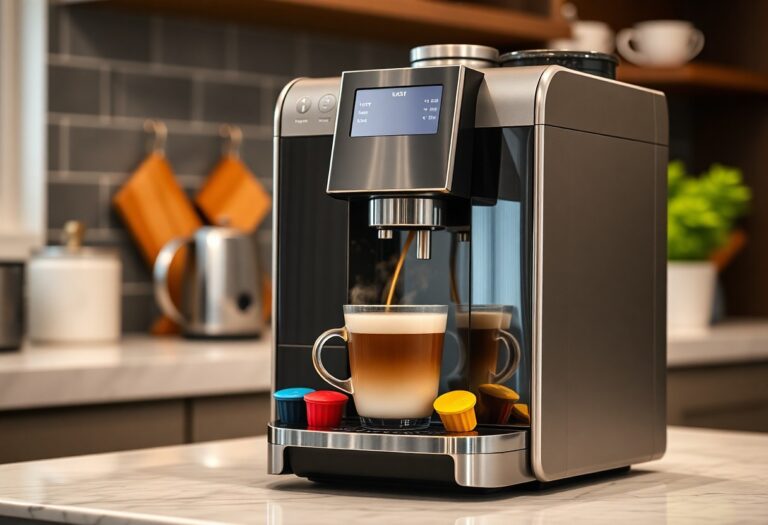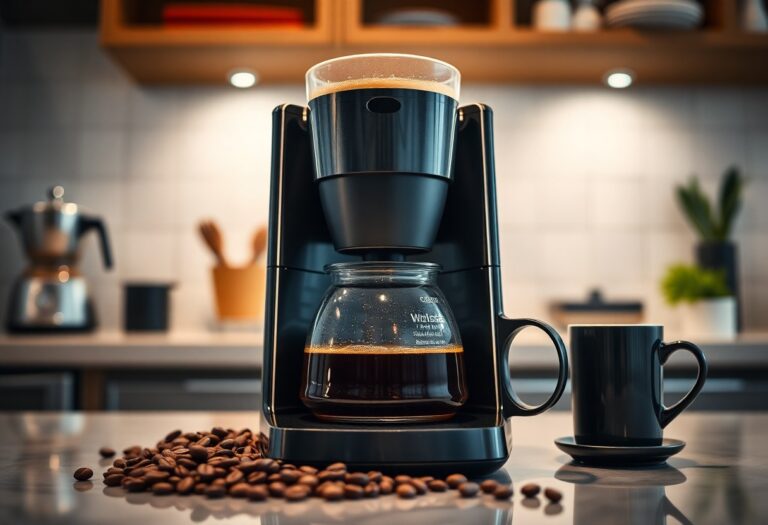What Does Calc Mean on a Bosch Coffee Machine – Descaling Alert
Calc is an indicator on your Bosch coffee machine that alerts you when it’s time for descaling. This process is vital for maintaining the longevity and performance of your machine, as limescale buildup can lead to malfunction and negatively impact the taste of your coffee. When the calc light illuminates, it’s a sign that you need to take action to clean your machine using a descaling solution. Ignoring this alert can result in more serious issues, so it’s important to address it promptly for the best coffee experience.

Key Takeaways:
- Calc is a descaling alert indicating mineral buildup in the coffee machine.
- Descaling is imperative for maintaining optimal performance and prolonging the lifespan of the machine.
- Typically, the Calc alert suggests it’s time to use a descaling solution or vinegar to clean the machine.
- Regular maintenance can prevent the calcification, enhancing the flavor of your coffee.
- Follow the machine’s instructions for descaling to ensure proper maintenance and avoid damage.
The Meaning of ‘Calc’ on Your Bosch Coffee Machine
The ‘Calc’ light on your Bosch coffee machine serves as a direct reminder that the unit needs descaling. Descaling is necessary to maintain the quality of your brewed coffee, as mineral deposits from hard water can accumulate over time. When you see this alert, it signifies that you should initiate the descaling process soon. For more insights on troubleshooting, check out this article on Red light after descaling a Bosch Tassimo coffee machine.
Understanding the Descaling Indicator
When the ‘Calc’ indicator lights up, it’s a straightforward signal that mineral buildup requiring your attention has occurred. Ignoring this alert can lead to subpar brewing performance, where you may notice a change in the flavor or temperature of your coffee. Engaging in regular descaling helps prolong the life of your coffee machine, ensuring it continues to function at its best.
Importance of Maintaining Calcium Levels
Maintaining calcium levels in your coffee machine is crucial for optimal performance. The presence of calcium ensures proper heating elements function smoothly. When calcium deposits are left to accumulate, they can obstruct components leading to longer brewing times or reduced thermal efficiency.
Excessive calcium buildup doesn’t just impact the taste of your coffee; it can also lead to long-term damage to your machine. Regularly addressing calcium levels through descaling can prevent issues like thermal runaway or damage to internal parts, ultimately providing you with richer flavors and consistent brewing temperatures. This upkeep translates into a better relationship between your coffee experience and your machine’s longevity.

Decoding the Descaling Process
Descaling your Bosch coffee machine may seem daunting, but breaking it down into simple steps makes it manageable. The process typically involves using a descaling solution, which you will mix with water, then fill your machine’s water reservoir. Be sure to follow your specific model’s instructions to effectively cleanse the internal components of mineral buildup, ensuring optimal performance and flavor in your coffee.
Signs That Your Machine Needs Descaling
You may notice several signs indicating it’s time to descale your coffee machine. These include a slower brewing time, decreased water flow, or an unusual taste in your coffee. Additionally, if the indicator light or the “Calc” message appears on your display, it’s a clear signal to take action.
The Science Behind Mineral Buildup in Coffee Machines
The buildup of minerals, primarily calcium and magnesium, occurs when water evaporates inside your coffee machine. As water passes through the heating element, these minerals remain behind, creating limescale deposits that can affect your machine’s efficiency. If left untreated, this buildup can lead to serious issues, including damage to heating elements and decreased coffee extraction quality.
This mineral accumulation is especially prevalent in areas with hard water, where higher concentrations of calcium and magnesium result in significant limescale formation. Over time, these deposits reduce the heating efficiency and can even block water flow entirely. For instance, in a typical coffee machine, a mere 0.5 mm of limescale can reduce the heating element’s efficiency by as much as 20%. Regular descaling helps to maintain your brewing equipment and prolongs its lifespan, ensuring a consistently delicious cup of coffee.
Step-by-Step Guide to Descaling Your Bosch Coffee Machine
| Step | Description |
|---|---|
| Step 1 | Gather your descaling solution, water, and a receptacle for collecting the solution. |
| Step 2 | Prepare your coffee machine by ensuring it’s turned off and unplugged. |
| Step 3 | Mix the descaling solution with water as per the product’s instructions. |
| Step 4 | Pour the mixture into the water reservoir of your machine. |
| Step 5 | Start the descaling process by following the specific steps outlined in your user manual. |
| Step 6 | After the process finishes, run clean water through the system to rinse it thoroughly. |
Preparing for the Descaling Process
Prior to initiating the descaling process, ensure that you have all necessary materials ready. This includes the descaling solution, typically available from Bosch or various retailers, and clean water. Assess your coffee machine to confirm it’s powered off and that the water tank is empty to avoid any overflow during the cleaning process.
Proper Use of Descaling Solutions
Using the right descaling solution is imperative for optimal results and the longevity of your coffee machine. Always opt for a solution designed specifically for Bosch machines to prevent damage and ensure effective mineral removal. Adhere to the manufacturer’s directions regarding dilution and application for the best outcome.
Adhering to the instructions provided for the descaling solution is non-negotiable. It typically involves mixing the solution with water at a specified ratio, ensuring you don’t exceed recommended concentrations, as this can be counterproductive. Some solutions might require a specific contact time with the machine’s interior, so pay close attention to those guidelines. Following these steps not only ensures your machine functions well but also maintains the quality of your coffee.
Easing the Transition: Tips for Preventing Future Calc Alerts
Maintaining your Bosch coffee machine can minimize the frequency of calc alerts, ensuring a consistently great brew. To prevent future alerts, consider implementing the following strategies:
- Regularly perform descaling using a recommended descaling solution.
- Adjust your brewing frequency based on water hardness in your area.
- Use filtered or bottled water to reduce mineral buildup.
- Keep your machine clean and well-maintained.
This proactive approach will help keep your coffee machine running smoothly.
Regular Maintenance Routines
Establish a routine for cleaning and descaling your Bosch coffee machine. Schedule descaling every 2-3 months depending on your usage and water hardness. Regularly clean removable parts such as filters and drip trays to prevent any buildup that may lead to calc alerts.
Choosing the Right Water for Brewing
Selecting the appropriate water type can significantly impact your coffee machine’s performance. Using filtered or bottled water that is low in minerals reduces the chances of calcification and enhances the flavor profile of your coffee. Tap water, particularly in hard water regions, tends to have high levels of calcium and magnesium that contribute to scale buildup. Opting for soft water helps maintain the quality of both your coffee and your coffee machine.
Long-Term Benefits of Regular Descaling
Consistent descaling significantly enhances the overall performance of your Bosch coffee machine. By regularly removing mineral buildup, you not only ensure that your machine operates smoothly, but you also elevate the quality of your brewed coffee. This proactive maintenance will save you both time and money in the long run by preventing costly repairs or replacements.
Enhancing Coffee Quality and Flavor
Descaling your coffee machine leads to a remarkable improvement in the taste of your coffee. When mineral deposits accumulate, they can affect the water temperature and pressure, resulting in uneven extraction and subpar flavor. By consistently descaling, you’re ensuring that every cup you brew achieves its full potential.
Prolonging the Life of Your Coffee Machine
Regular descaling is vital for extending the lifespan of your Bosch coffee machine. The buildup of minerals can lead to clogs and malfunction, which may require professional servicing. By taking a few moments to descale every couple of months, you protect your investment and keep your machine running efficiently.
Failing to prioritize descaling can result in serious damage over time. The internal components of your coffee machine, such as the heating element and water pump, can suffer when obstructed by scale buildup. This damage often leads to expensive repairs or irreversible issues that may render your machine unusable. Therefore, establishing a descaling routine ensures that components remain in optimal condition, allowing you to enjoy your favorite brews for years to come.
Conclusion
Considering all points, when your Bosch coffee machine displays “Calc,” it signals that it’s time for descaling. This alert helps you maintain optimal performance and extend the life of your appliance. Descaling removes mineral buildup from hard water, ensuring your coffee continues to taste great. By promptly addressing this alert, you not only enhance your coffee-making experience but also protect your investment. Stay proactive in your machine’s upkeep, and enjoy the rich flavor of your favorite brews for years to come.
FAQ
Q: What does the “Calc” symbol mean on my Bosch coffee machine?
A: The “Calc” symbol indicates that your coffee machine requires descaling. This alert appears when the machine’s internal sensors detect a build-up of limescale due to hard water usage. It’s a reminder to descale your machine to maintain optimal performance and ensure great-tasting coffee.
Q: How often should I descale my Bosch coffee machine?
A: The frequency of descaling depends on the hardness of your water and how often you use the machine. Generally, it is recommended to descale your Bosch coffee machine every 2-3 months if you use hard water. For softer water, you might extend this interval. Always refer to your user manual for specific recommendations based on your model.
Q: What descaling product should I use with my Bosch coffee machine?
A: Bosch recommends using their own descaling solution specifically designed for their coffee machines. These products are formulated to effectively break down limescale without damaging the internal components. Additionally, you can also use other non-corrosive descalers, but it’s important to check if they are compatible with your particular machine model.
Q: How do I start the descaling process on my Bosch coffee machine?
A: To start the descaling process, you will first need to prepare your machine and the descaling solution according to the instructions in your user manual. Typically, you’ll fill the water reservoir with the descaling solution and water mixture, then initiate the descaling program via the control panel. Follow the prompts displayed on the screen until the process is complete.
Q: What should I do after the descaling process is complete?
A: Once the descaling process is complete, it’s important to rinse the machine thoroughly to remove any remaining solution. Fill the water reservoir with fresh water and run a couple of cycles to flush out the system. This ensures that no descaling solution affects the taste of your coffee. After rinsing, the “Calc” symbol should turn off if the process was successful.







